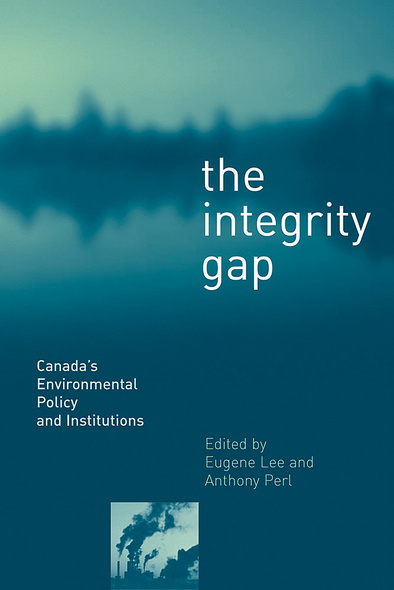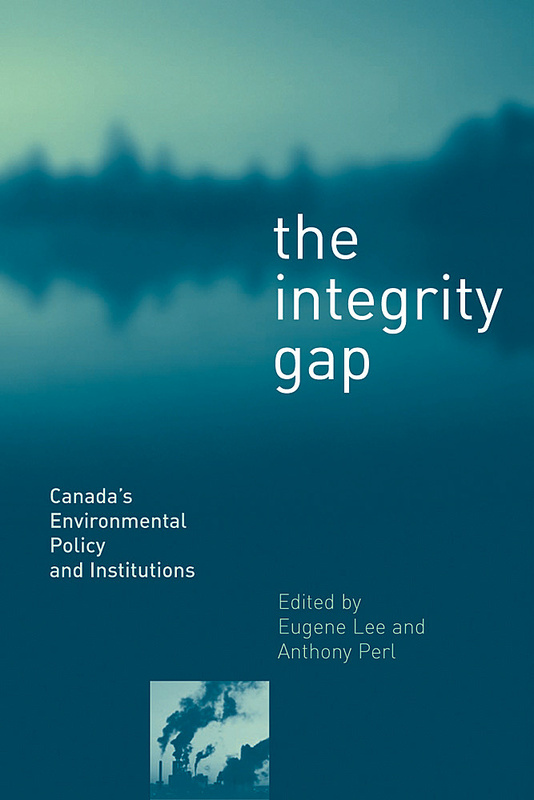
The Integrity Gap
Canada's Environmental Policy and Institutions
This thoughtful collection exposes the gap between rhetoric andperformance in Canada’s response to environmental challenges.Canadians, despite their national penchant for environmentaldiscussion, have fallen behind their G-8 peers in both domesticcommitments and international actions. In a cogent examination of theissue, eight authors demonstrate how Canada’s configuration ofpolitical and economic institutions has limited effective environmentalpolicy. Canadian environmental institutions, the authors argue, haveproduced an integrity gap: the sustainability rhetoric adopted bypolicymakers fails to achieve concrete results. In an analysis thatpenetrates several policy domains and combines various disciplinary,sectoral, and geographic perspectives, the authors demonstrate howCanada fell from leader to laggard within the internationalenvironmental community.
Placing the study of Canadian environmental policy within a soundtheoretical framework for the first time, this book makes a significantcontribution to existing policy scholarship. It will find anenthusiastic audience among political scientists, neo-institutionaltheorists, policy analysts, and students at both undergraduate andgraduate levels.
A useful matrix in the introductory chapter identifies the institutional constraints that prevent Canadian governments delivering stated environmental goals ... The case studies offer useful support for this hypothesis.
The existence of an integrity gap in Canadian environmental policymaking is well known at the anecdotal level, but this is the first scholarly treatment I have seen that places it within an established theoretical framework. The book makes a very significant contribution both to our understanding the problem and of some of the ways it might be addressed.
Figures and Tables
Acknowledgments
1. Institutions and the Integrity Gap in Canadian EnvironmentalPolicy / Eugene Lee and Anthony Perl
2. How Canada's Stumbles with Environmental Risk ManagementReflect an Integrity Gap / William Leiss
3. Canadian Environmental Policy and the Natural Resource Sector:Paradoxical Aspects of the Transition to a Post-Staples PoliticalEconomy / Michael Howlett
4. International Institutions and the Framing of Canada'sClimate Change Policy: Mitigating or Masking the Integrity Gap? /Steven Bernstein
5. Energy Mixes and Future Scenarios: The Nuclear OptionDeconstructed / Michael D. Mehta
6. Participatory Management and Sustainability: Evolving Policy andPractice in a Mountain Environment / Fikret Berkes, Jay Anderson,Colin Duffield, J.S. Gardner, A.J. Sinclair, and Greg Stevens
7. Policy Communities and Environmental Policy Integrity: A Tale ofTwo Canadian Urban Air Quality Initiatives / Anthony Perl
8. Integrity of Land-Use and Transportation Planning in the GreaterToronto Area / Richard Gilbert
9. Toronto's Exhibition Place: Closing the Integrity Gap betweena Nineteenth-Century Fairground and a Sustainable Twenty-First-CenturyCity / David Gurin
10. Conclusion / Anthony Perl and Eugene Lee
Notes on Contributors
Index





